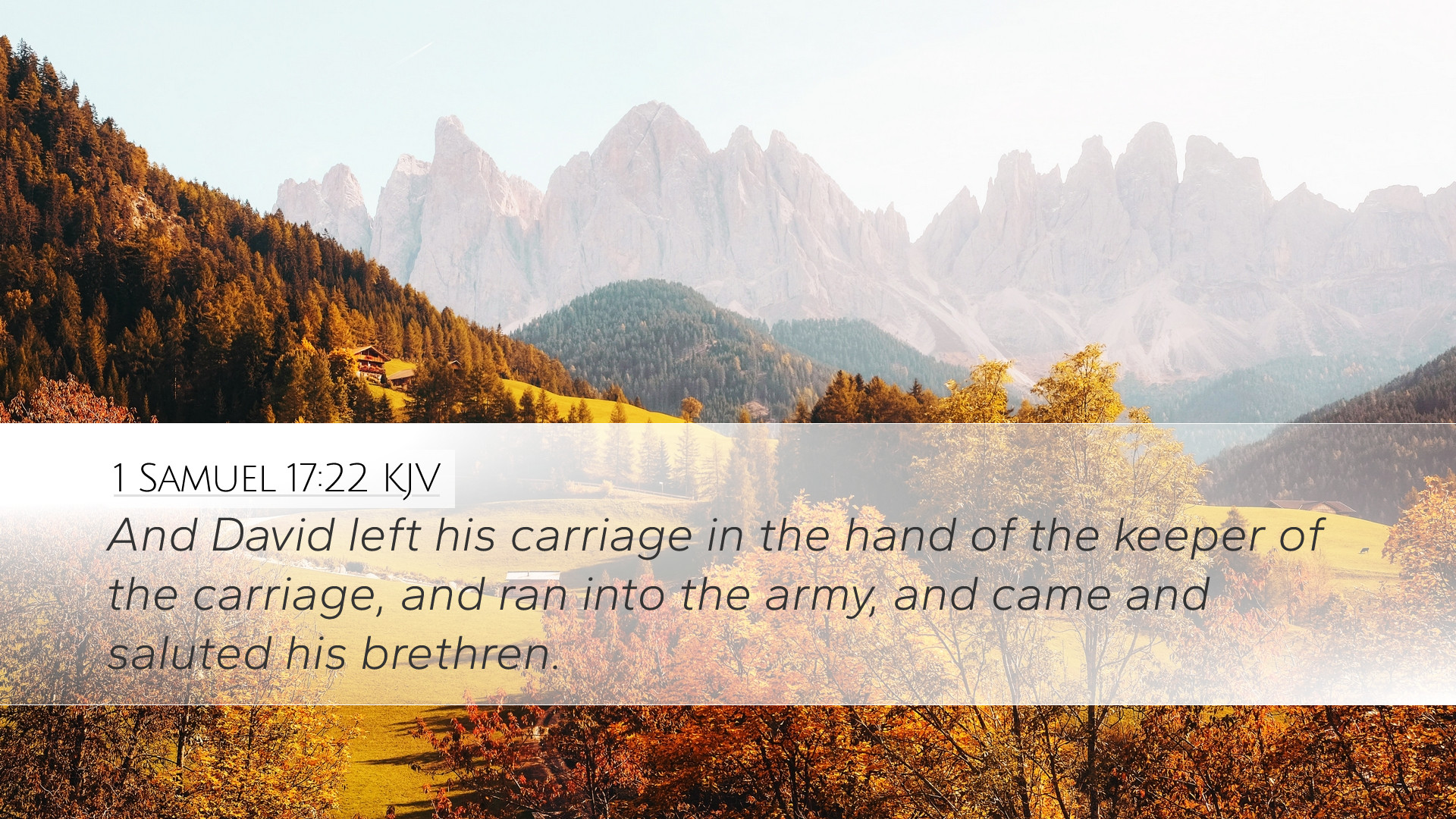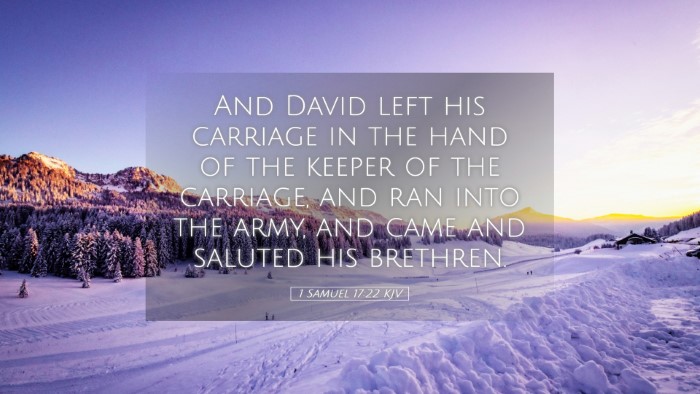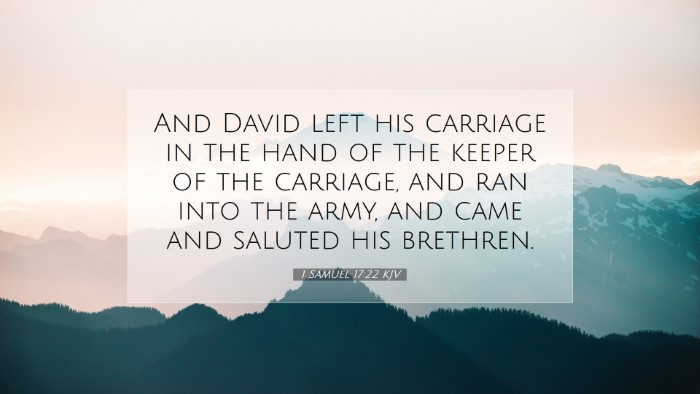Commentary on 1 Samuel 17:22
1 Samuel 17:22 states:
“And David left his carriage in the hand of the keeper of the carriage, and ran into the army, and came and saluted his brethren.”
Overview
This verse occurs in the context of the well-known confrontation between David and Goliath, the Philistine giant. David, a young shepherd, is brought into an environment of warfare and becomes a pivotal figure in Israel's struggle for survival against their enemies. The actions of David in this verse highlight not only his courage but also his desire to engage with his brothers and the Israelite army. This commentary draws from insights provided by Matthew Henry, Albert Barnes, and Adam Clarke to unpack the theological and practical implications of this moment in biblical history.
Contextual Background
Historical Context: At the time of this narrative, Israel is embroiled in conflict with the Philistines. The challenge presented by Goliath has instilled fear within the Israelite ranks. David, who has been anointed as future king yet remains in the role of a shepherd, is thrust into a scenario that would ultimately define his identity and purpose.
Commentary Insights
Matthew Henry's Commentary
Matthew Henry emphasizes the importance of David’s energy and enthusiasm. He notes that David’s act of leaving his carriage underlines a transition from an ordinary role to a heroic purpose. It demonstrates David's commitment not only to his family but also to God’s people. His salutation of his brothers shows a personal connection amidst the military conflict, indicating that his heart was not solely in the physical task of battle but also in bonds of family and community. Henry further observes that David’s eagerness to engage reflects a deeper spiritual readiness to confront evil—a hallmark of true leadership.
Albert Barnes' Notes
Albert Barnes provides further elucidation on the role of David as a messenger. In his commentary, he highlights that David, upon arrival, was sent by his father to check on his brothers and bring back news. This servant-hearted action speaks volumes about David's character; despite his future as a king, he remains dutiful. Barnes notes that David running to the army, rather than dragging his feet in hesitation, signifies a readiness for service and an impulse to support his kin, serving as an example for leaders who must be willing to act decisively.
Adam Clarke’s Commentary
Adam Clarke draws attention to the phrase "saluted his brethren." He elaborates on the cultural significance of greeting and its implications for community and solidarity. Clarke explains that the greeting represents not only a familial bond but also a solidarity with the warriors in the face of imminent danger. He notes that David’s action demonstrates a contrast to the prevailing fear among the soldiers; while they stood frozen, awaiting Goliath’s challenge, David entered boldly, exuding confidence and purpose. Clarke suggests that this illustrates a fundamental truth: faith in God can provide the courage to act, even when confronted with overwhelming odds.
Theological Implications
The actions of David encapsulated in this verse provide profound theological truths for reflection. Key themes emerge regarding leadership, sacrifice, and faithfulness in service. David’s readiness to engage with the situation around him exemplifies a servant-leader model; he is not passive but active in fulfilling his role as a protector and supporter of his family and nation.
- Courage in the Face of Adversity: David's decision to leave his carriage speaks to his willingness to confront fear. This serves as a model for believers who face their challenges, encouraging them to act with faith instead of fear.
- Community Engagement: The importance of relationships within the body of Christ is underscored by David's greeting to his brothers. This action calls for engagement and solidarity among believers in times of crisis.
- Divine Preparation: David’s anointing as king comes into play as he takes initiative. His journey from the fields to the battlefield signifies how God sharpens and prepares leaders for pivotal roles through various life experiences.
Practical Applications
This passage inspires several practical applications for modern readers, particularly for pastors, students, and theologians:
- Active Participation: Believers are called to step out of their comfort zones, actively participating in the life of the church and their communities, much like David who did not hesitate to run to the battle line.
- Leaders as Servant-Models: Leaders are encouraged to embrace the dual role of servanthood and authority—serving their community while also guiding them towards faith and action.
- Encouragement to Eye on God: When facing giants—be it personal trials or church challenges—keeping faith in God provides the strength and assurance needed to proceed forward with confidence.
Conclusion
1 Samuel 17:22 lays a foundational narrative within the epic tale of David and Goliath. David’s transition from a simple shepherd to a leader of Israel exemplifies the transformative power of faith and courage. This verse encapsulates crucial themes of community, service, and the empowering presence of God in moments of decision. By examining David’s actions through the insights of renowned biblical commentators, we derive not only an understanding of the text itself but also applicable truths for contemporary faith communities.


